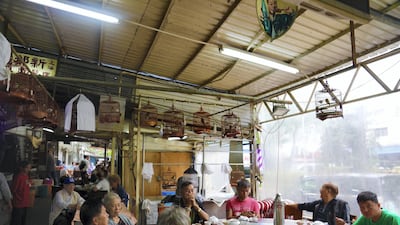Beyond the yells of the market traders peddling lychees and seafood in Hong Kong’s working-class Choi Hung neighbourhood, a motley crew assembles every Sunday at the crack of dawn to keep an ancient tradition alive.
These Hong Kongers are making their way to a humble cafe armed with delicately hand-carved bamboo cages sheathed in dark cloth to keep the birds inside calm.
In one, a creamy hazel Siberian accentor warbles sweetly; the scarlet plumage of a red-faced liocichla draws the eye in another; a third contains a lark hooting like a toddler who’s got his hands on a flute.
Dozens of these intricate cages hang from the ceiling poles of Xin Long Cheng, which serves steaming char siu bao and pots of jasmine tea to this small, ornithophile community – Hong Kong’s bird men.
“My father used to bring his birds to cafes for many years,” says Chung Lai, an elder of the group and bird keeper for 30 years, while casually using chopsticks to feed a live grasshopper to his zebra finch.
“It’s a culture; an old Cantonese one. This place lets us bring them together, and they can sing with each other. We bring our birds here because we adore them.”

Hong Kongers’ love of birds goes back centuries to the imperial Qing dynasty of the Manchus in the 17th century when nobles and eunuchs began keeping pet birds as a hobby. It carried on to modern times.
Like Parisian flâneurs who would elegantly stroll around the city with tortoises on leashes during the 19th century, men and women once carried their birds in cages across Hong Kong to a cafe, the park, or simply for a walk. It’s still considered good luck to have a swallow’s nest above your home.
More than 500 species of birds, including the endangered black-faced spoonbill, have been recorded in the city – around a third of China’s total and 5 per cent of the entire world’s known species.
“This is an amazing place for them because of the subtropical climate,” says Wu Lan of the Hong Kong Bird Watching Society.
Melodious chirps and tweets ring out above the clatter of crockery in Xin Long Cheng, perhaps the last cafe of its kind.
“They’re all closed now,” despairs Julie Lam, whose trio of red and green eclectus parrots sit on a low branch outside. “There are no more places left in Hong Kong.”
Since the emergence of avian flu in Hong Kong in 1997, which killed six people, bird keeping in the city has dropped in popularity. Millions of birds were culled and a crackdown launched on poor hygiene practices in tens of Hong Kong’s bird cafes, leaving Xin Long Cheng a solitary hub for the city’s remaining bird men.
Today’s challenges to the community look a little different. The political protests that rocked the city for more than 100 days have resulted in cancelled meetings because of transport and safety issues.
However, the space remains a deeply significant place for some. “Birdsong clears my mind and cleanses my soul,” says Yu Tung, a businessman who believes a sprightly robin purchased three years ago cured his depression.
Of similar importance is the city’s atmospheric Yuen Po street market, which sells exotic birds, ornate cages, porcelain water dishes and writhing bags of insects. But it’s becoming smaller every year.
For now, birds are the glue that holds this diverse community – of young and old, from different circumstances and histories, out of need or pleasure – together. It’s a practice of the people.
“In contrast to early modern Europe, where hunting with birds was often considered to be a royal and noble code, in China, falconry was practised by ordinary citizens,” explains Xinxian Zheng, a Princeton anthropologist who has written about the symbolic function of birds.
Back at the cafe, despite the turbulent conditions caused by health scares and protests, enthusiasm is as strong as ever, particularly from an eccentric bird lover with sweeping highlighted hair and a neon orange T-shirt called Ron.
“My friends don’t call me batman – but birdman,” grins the 26-year-old toothily, using a small speaker playing songs on a loop to teach his birds.
“I have many, many birds at my house. It’s like a shop. Some can learn eloquent tunes quickly but others can only chirp a few tuneless songs. Some are shy; others are rowdy. They have personalities like humans – like me.”

